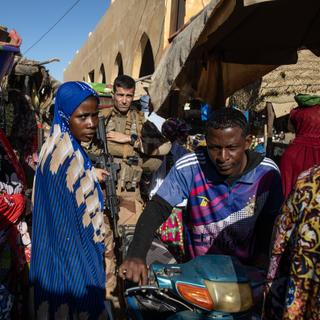


The insurmountable failure of France's strategy in the Sahel
News'France-Africa, the breakdown' (2/3). France's overemphasis on the security aspect of its strategy in the West African region, at the expense of supporting the development of various states, led to the failure of a decade of military presence.
It's one of the fundamental principles of planning any military operation, repeated endlessly to young officers to spare them from futile wars: There is no worthwhile military victory without social and political support. However, if there is one lesson that is brutally obvious to France at the end of a decade of intervention in Africa, it is the failure of this civil-military coordination – as it is referred to in strategy manuals – which was supposed to be the prerequisite of a prolonged presence in the Sahel.
Those within defense circles still use understated terms like "blunders" and "squabbles" when describing the shortcomings of this coordination. From the outset, it was supposed to contain jihadism's spread in five Sahel countries (Burkina Faso, Mali, Mauritania, Niger and Chad) while providing extensive development aid to the countries of the region. This coordination never quite took shape, even after the attempt to structure it around a genuine consortium of donors: the Sahel Alliance, launched in July 2017 by France, Germany and the European Union, along with 10 other countries and international financial institutions.
"Have we been kidding ourselves?" asked a business source during the launch of France's main military operations in recent years. "We've managed the whole thing like idiots," said a diplomat who had long been stationed in the region more harshly, as the withdrawal of 1,500 French troops from Niger began on October 10. This was the third departure in less than two years from a country among France's former colonies in Africa.
How did we get to this point? Who was at fault? One thing is certain, from Bamako to Paris, from Ouagadougou to Lomé: The divergence dates back to 2014, the year in which France's Operation Serval became Operation Barkhane. Back then, France could proudly claim a remarkable military achievement. Mali had been on the verge of collapse and cut in two for several months. Tuareg independence fighters allied with jihadist groups affiliated with Al-Qaeda in the Islamic Maghreb (AQIM) controlled the northern half of the country. They did not threaten the capital, Bamako, but their hold continued to grow towards central Mali. Operation Serval, launched in January 2013 at the request of the Malian authorities by former president François Hollande (2012-2017), after having long postponed the idea, quickly scrambled the landscape in just three months.
Change in approach
With some 4,500 soldiers deployed, Serval became France's largest external operation since the Algerian War. It had been in the works since Nicolas Sarkozy's presidency (2007-2012). In 2009, he had started implementing a Sahel plan for counterterrorism, involving the deployment of French instructors to Mali, Mauritania and Niger, and setting up a permanent special forces base in Ouagadougou, Burkina Faso. Serval was primarily a response to the repercussions of Muammar Gaddafi's death on October 20, 2011: the Libyan leader killed after the intervention of French fighter jets and helicopter gunships sent by Sarkozy. The fall of the Gaddafi regime freed contingents of Tuareg fighters involved in his Islamic Legion, who then returned to the Malian desert.
You have 90% of this article left to read. The rest is for subscribers only.
